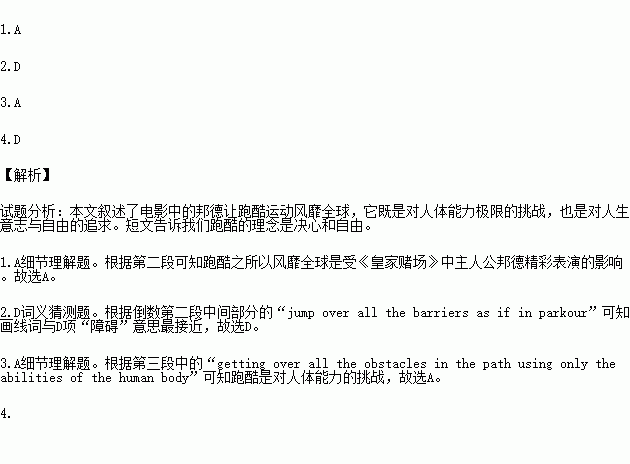题目内容
“Our aim is to take our art to the world and make people understand what it is to move,” said David Belle, the founder of parkour ( also called free running-a kind of extreme sport).
Do you love running? It is a good exercise, yet many people find it boring. But what if making your morning jog a creative one? Like jumping from walls and over gaps, and ground rolls? Just like the James Bond in the movie Casino Royale? Bond jumps down from a roof to a windowsill and then runs several blocks over obstacles on the way. It is just because of Bond’s wonderful performances that the sport has become popular worldwide.
Yes, that’s parkour, an extreme street sport aimed at moving from one point to another as quickly as possible, getting over all the obstacles in the path using only the abilities of the human body. Parkour is considered an extreme sport. As its participants dash around a city, they may jump over fences, run up walls and even move from rooftop to rooftop.
Parkour can be just as exciting and charming as it sounds, but its participants see parkour much more than that.
Overcoming all the obstacles on the course and in life is part of the philosophy(理念) behind parkour. This is the same as life. You must determine your destination, go straight, jump over all the barriers as if in parkour and never fall back from them in your life, to reach the destination successfully. A parkour lover said, “I love parkour because its philosophy has become my life, my way to do everything.”
Another philosophy we’ve learnt from parkour is freedom. It can be done by anyone, at any time, anywhere in the world. It is a kind of expression of trust in yourself that you earn energy and confidence.
1.Parkour has become popular throughout the world because of .
A. the film, Casino Royale
B. its founder, David Belle
C. its risks and tricks
D. the varieties of participants
2.The underlined word “obstacles” in Paragraph 2 is closest in meaning to“ ”.
A. streets B. objects C. roofs D. barriers
3.Which of the following is true of parkour?
A. It challenges human abilities.
B. It is a good but boring sport.
C. It needs special training.
D. It is a team sport.
4.Which of the following is the philosophy of parkour?
A. Sports and extremes.
B. Excitement and popularity.
C. Dreams and success.
D. Determination and freedom.
 天天向上一本好卷系列答案
天天向上一本好卷系列答案 小学生10分钟应用题系列答案
小学生10分钟应用题系列答案
